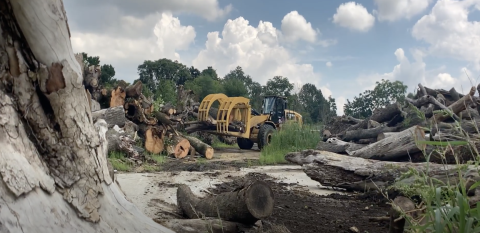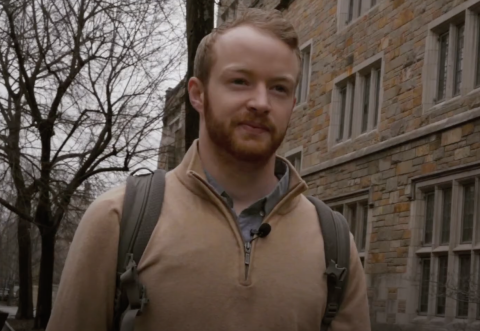Cambium Carbon — an initiative to combat climate change and revitalize urban communities by reimagining the urban tree lifecycle — has secured significant financial backing from several major conservation finance sources. Founded by Ben Christensen ’20 MEM and developed with classmate Marisa Repka ’20 MEM, Cambium recently partnered with The Arbor Day Foundation to earn its largest prize yet: a $200,000 Natural Climate Solution Accelerator Grant from The Nature Conservancy.
Cambium’s aim is to build “reforestation hubs,” a first-of-its-kind public-private partnership that restores city forests across the U.S. The company hopes to raise funds to plant trees in urban natural areas by valuing their benefits — like the raw wood material they provide and their ability to absorb carbon dioxide — to help turn the tide of urban forest loss.
More simply put, they are creating systems that turn cut or fallen urban trees into wood products that can be sold to fund tree-planting efforts. Usually, trees removed from cities are not put to their best use; they are either chipped for low-grade application or hauled to a landfill at a significant cost.
“Our model turns waste into wood into new trees,” says Christensen. “We turn a waste stream into higher value products and then connect those revenues to new tree planting and maintenance.” In addition to the environmental benefits, Christensen says Cambium is partnering with major cities to develop “urban mills” that convert the trees into usable lumber, creating a dedicated revenue stream and local employment opportunities.
Cambium will partner with
The Arbor Day Foundation, a national tree-planting nonprofit, to conduct stakeholder engagement and tree data collection and analysis in U.S. cities over the next 15 months with the aim of developing and launching local “reforestation hubs.”
“This grant enables our team to fill a critical capacity gap,” says Repka, who serves as Cambium’s city partnership lead. “It provides an opportunity to help cities assess the economic, social, and environmental potential of a circular urban forestry system.”
The idea for Cambium Carbon was borne during Christensen’s internship with the World Resources Institute in summer 2019, where he worked on federal carbon removal policy. Building a finance model based on his Renewable Energy Project Finance course at YSE, Christensen was able to secure initial seed funding to start Cambium Carbon, but the initiative truly took off when he joined the fall 2019 Accelerator cohort of the
Tsai Center for Innovative Thinking at Yale (CITY).
Cambium Carbon also won funding from the Sobotka Seed Stage Venture Program and a Climate Change Innovation Seed Grant from the Yale Center for Business and the Environment (CBEY). Tsai CITY also provided additional funding through its Summer Accelerator program, which allowed Christensen and Repka to field a team of Yale students to continue building the initiative, including Yale School of Management students Dylan Murray and Ben Selden.
 Cambium Carbon aims to turn cut or fallen urban trees into wood products that can be sold to fund tree-planting efforts. Currently, most trees removed from cities are either chipped for low-grade application or hauled to a landfill at a significant cost.
Cambium Carbon aims to turn cut or fallen urban trees into wood products that can be sold to fund tree-planting efforts. Currently, most trees removed from cities are either chipped for low-grade application or hauled to a landfill at a significant cost.
 Ben Christensen '20 MEM is the founder of Cambium Carbon, an idea borne from his internship with the World Resources Institute in summer 2019.
Ben Christensen '20 MEM is the founder of Cambium Carbon, an idea borne from his internship with the World Resources Institute in summer 2019.